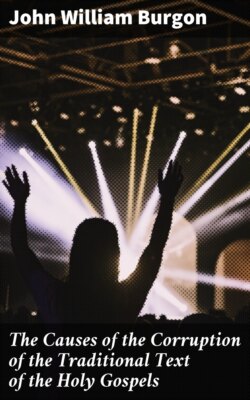Читать книгу The Causes of the Corruption of the Traditional Text of the Holy Gospels - John William Burgon - Страница 34
На сайте Литреса книга снята с продажи.
§ 6.
ОглавлениеTable of Contents
I have reserved for the last a specimen which is second to none in suggestiveness. 'Whom will ye that I release unto you?' asked Pilate on a memorable occasion[92]: and we all remember how his enquiry proceeds. But the discovery is made that, in an early age there existed copies of the Gospel which proceeded thus—'Jesus [who is called[93]] Barabbas, or Jesus who is called Christ?' Origen so quotes the place, but 'In many copies,' he proceeds, 'mention is not made that Barabbas was also called Jesus: and those copies may perhaps be right—else would the name of Jesus belong to one of the wicked—of which no instance occurs in any part of the Bible: nor is it fitting that the name of Jesus should like Judas have been borne by saint and sinner alike. I think,' Origen adds, 'something of this sort must have been an interpolation of the heretics[94].' From this we are clearly intended to infer that 'Jesus Barabbas' was the prevailing reading of St. Matt. xxvii. 17 in the time of Origen, a circumstance which—besides that a multitude of copies existed as well as those of Origen—for the best of reasons, we take leave to pronounce incredible[95].
The sum of the matter is probably this:—Some inattentive second century copyist [probably a Western Translator into Syriac who was an indifferent Greek scholar] mistook the final syllable of 'unto you' (ΥΜΙΝ) for the word 'Jesus' (ΙΝ): in other words, carelessly reduplicated the last two letters of ΥΜΙΝ—from which, strange to say, results the form of inquiry noticed at the outset. Origen caught sight of the extravagance, and condemned it though he fancied it to be prevalent, and the thing slept for 1500 years. Then about just fifty years ago Drs. Lachmann, Tischendorf and Tregelles began to construct that 'fabric of Textual Criticism' which has been the cause of the present treatise [though indeed Tischendorf does not adopt the suggestion of those few aberrant cursives which is supported by no surviving uncial, and in fact advocates the very origin of the mischief which has been just described]. But, as every one must see, 'such things as these are not 'readings' at all, nor even the work of 'the heretics;' but simply transcriptional mistakes. How Dr. Hort, admitting the blunder, yet pleads that 'this remarkable reading is attractive by the new and interesting fact which it seems to attest, and by the antithetic force which it seems to add to the question in ver. 17,' [is more than we can understand. To us the expression seems most repulsive. No 'antithetic force' can outweigh our dislike to the idea that Barabbas was our Saviour's namesake! We prefer Origen's account, though he mistook the cause, to that of the modern critic.]
FOOTNOTES:
